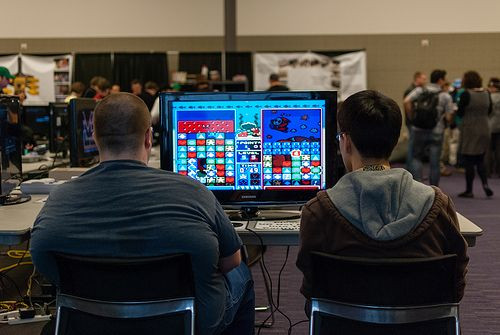Playing Tetris Stops Food Cravings: How Nagging Hunger Pangs Get Crowded Out Of The Brain

For some people, hunger is an inconvenience, a slight bother. For others, it’s an all-consuming distraction, which makes accomplishing other tasks improbable and responding peaceably to other people impossible. Now, a new study from Plymouth University’s Cognition Institute suggests the simple act of playing Tetris can stop food cravings in their tracks.
Hunger is indeed a biological response: We feel hungry because the hormone ghrelin is in short supply, alerting our brains that our stomach needs nutrients. But even though our stomachs are the ones making noise, it’s really our brains that tell us whether we should eat or not. After all, it’s the signals in our brain that motivate action. And since we humans have a limited amount of attention we can devote to a particular emotion or sensation, in this case, having too much fun makes us forget we’re hungry.
“It’s great to really want to eat or make love, if that’s possible right now,” David Kavanagh of Queensland University of Technology, who wasn’t involved with the study, told Discovery News. “But it’s a torture if you can’t. So, if we can help people deal with craving — blunt it a bit, or give them some time out — it can not only help them stay in control, but it may make them feel a bit better as well.”
As the research team points out, Tetris’ effects aren’t limited specifically to food cravings, and likewise, Tetris isn’t the only highly demanding, fun task that can suppress cravings. But the effect of craving reduction, be it sex or food or smoking, is characterized by one overarching principle, which the team has dubbed their Elaborated Intrusion Theory (EIT).
What’s Going On Up There?
Basically, the human brain can only concentrate on select number of stimuli at a given time, and often, just one. Recall the Three Stooges trying to squeeze through a tiny door all at the same time. None can get in because they’re all wedged between the other two. The same relative process happens when you’re confronted with multiple cognitive tasks. Your brain may receive ghrelin’s signals, which tell you you’re hungry, but when a storm of brightly colored shapes needs to be oriented in a certain way, and in a certain amount of time, hunger slides to the back burner. Fundamentally, EIT suggests that desire can be actively controlled by the presence of intruding imagery.
To conduct their study, the team recruited subjects to either play a game of Tetris or sit in front of a computer loading screen. Experimenters took note of the subjects’ natural cravings (that is, without the influence of food present) before and after their assigned task. Those who played Tetris reported cravings that were 24 percent weaker compared to the other group, suggesting to the team that EIT was at play. Subjects were forced to picture the incoming shapes, which made less “room” for the images of food they’d held before. Essentially, their brains were too busy to be hungry.
In reality, this seems backward. Normally it’s when we’re hungry that we can’t concentrate on what it is we should be doing. “What this and some other recent studies do, is flip this around,” Kavanagh explained. “If craving interferes with other tasks, what about using other tasks to interfere with craving? And if craving is linked to imagery, what about using another task that requires similar limited cognitive space — like this game."
Prior research has upheld this phenomenon, such as a 2009 study conducted by Plymouth researcher Jackie Andrade. Andrade found that doodling — the aimless, freeform scribbling that otherwise seems like written daydreaming — actually improves people’s ability to concentrate. Andrade’s study showed that people taking information over the phone were 29 percent better at recalling that info when they doodled in the process.
Daydreaming, like hunger pangs in the latest study, served as the distracting image. So when another process stood in, distraction abated and performance soared — just something to think about the next time hunger strikes and food is nowhere to be found. “This study is important,” Kavanagh remarked, “in that it uses desires that are just naturally occurring, and shows that the idea still works.”
Source: Skorka-Brown J, Andrade J, May J. Playing ‘Tetris’ reduces the strength, frequency and vividness of naturally occurring cravings. Appetite. 2014.



























